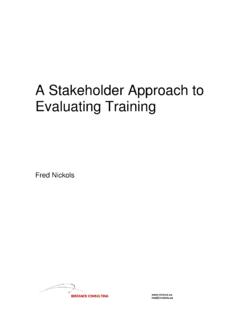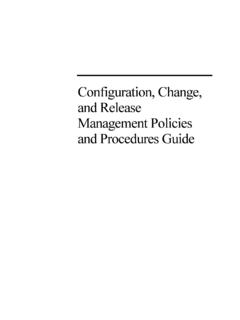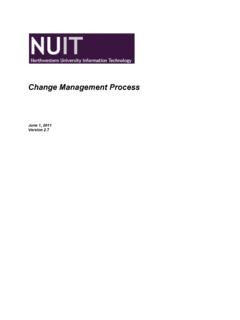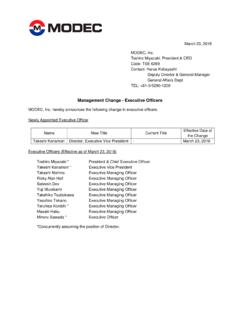Transcription of Change Management 101 - Distance Consulting LLC
1 2016 Change Management 101 A Primer Fred Nickols Change Management 101 Fred Nickols 2016 Page 1 SE C T I O N I: CO N T E N T, PU R P O S E & AU D I E N C E This paper presents some basics regarding Change Management and it does so from several perspectives, including those of Change Management as (1) the task of managing Change , (2) an area of professional practice, (3) a body of knowledge and (4) a control mechanism. It also examines Change Management as a matter of problem finding and problem solving and it reviews some basic Change Management strategies and required skills. The purpose of this paper is to provide a broad overview of the concept of Change Management .
2 It was written primarily for people who are coming to grips with Change Management problems for the first time and for more experienced people who wish to reflect upon their experience in a structured way. SE C T I O N I I: CH A N G E MA N A G E M E N T DE F I N E D FO U R BA S I C DE F I N I T I O N S In thinking about what is meant by Change Management , at least four basic definitions come to mind: 1. The task of managing Change . 2. An area of professional practice. 3. A body of knowledge. 4. A control mechanism. TH E TA S K O F MA N A G I N G CH A N G E The first and most obvious definition of Change Management is that the term refers to the task of managing Change .
3 The obvious is not necessarily unambiguous. Managing Change is itself a term that has at least two meanings. One meaning of managing Change refers to the making of changes in a planned and managed or systematic fashion. The aim is to more effectively implement new methods and systems in an ongoing organization. The changes to be managed lie within and are controlled by the 1 Perhaps the most familiar instance of this kind of Change is the Change control aspect of information systems development projects. Change Management 101 Fred Nickols 2016 Page 2 However, these internal changes might have been triggered by events originating outside the organization, in what is usually termed the environment.
4 Hence, the second meaning of managing Change , namely, the response to changes over which the organization exercises little or no control ( , legislation, social and political upheaval, the actions of competitors, shifting economic tides and currents, and so on). Researchers and practitioners alike typically distinguish between a knee-jerk or reactive response and an anticipative or proactive response. The task of managing Change also includes managing its impact on people. For many managers, this aspect of the task of managing Change is complicated by the fact that they have to help their people cope with Change and the managers also face their own coping challenges.
5 AN AR E A O F PR O F E S S I O N A L PR A C T I C E The second definition of Change Management is "an area of professional practice." There are dozens, if not hundreds, of independent consultants who will quickly and proudly proclaim that they are engaged in planned Change , that they are Change agents, that they manage Change for their clients, and that their practices are Change Management practices. There are numerous small Consulting firms whose principals would make these same statements about their firms. And, of course, most of the major Management Consulting firms have a Change Management practice area. Some of these Change Management experts claim to help clients manage the changes they face the changes happening to them.
6 Others claim to help clients make changes. Still others offer to help by taking on the task of managing changes that must be made. In almost all cases, the process of Change is treated separately from the specifics of the situation. It is expertise in this task of managing the general process of Change that is laid claim to by professional Change agents. A BO D Y O F KN O W L E D G E Stemming from the view of Change Management as an area of professional practice there arises yet a third definition of Change Management : the content or subject matter of Change Management . This consists chiefly of the models, methods and techniques, tools, skills and other forms of knowledge that go into making up any practice.
7 Change Management 101 Fred Nickols 2016 Page 3 The content or subject matter of Change Management is drawn from psychology, sociology, business administration, economics, industrial engineering, systems engineering and the study of human and organizational behavior. For many practitioners, these component bodies of knowledge are linked and integrated by a set of concepts and principles known as General Systems Theory (GST). It is not clear whether this area of professional practice should be termed a profession, a discipline, an art, a set of techniques or a technology. For now, suffice it to say that there is a large, reasonably cohesive albeit somewhat eclectic body of knowledge underlying the practice and on which most practitioners would agree even if their application of it does exhibit a high degree of variance.
8 A CO N T R O L ME C H A N I S M For many years now, Information Systems groups have tried to rein in and otherwise ride herd on changes to systems and the applications that run on them. For the most part, this is referred to as version control and most people in the workplace are familiar with it. In recent years, systems people have begun to refer to this control mechanism as Change Management . Moreover, similar control mechanisms exist in other areas. Chemical processing plants, for example, are required by OSHA to satisfy some exacting requirements in the course of making changes. These fall under the heading of Management of Change or MOC.
9 To recapitulate, there are at least four basic definitions of Change Management : 1. The task of managing Change (from a reactive or a proactive posture) 2. An area of professional practice (with considerable variation in competency and skill levels among practitioners) 3. A body of knowledge (consisting of models, methods, techniques, and other tools) 4. A control mechanism (consisting of requirements, standards, processes and procedures). CO N T EN T A N D PR O C E S S Organizations are highly specialized systems and there are many different schemes for grouping and classifying them. Some are said to be in the retail business, others are in manufacturing, and still others confine their activities to distribution.
10 Some are profit-oriented and some are not for profit. Some Change Management 101 Fred Nickols 2016 Page 4 are in the public sector and some are in the private sector. Some are members of the financial services industry, which encompasses banking, insurance, and brokerage houses. Others belong to the automobile industry, where they can be classified as original equipment manufacturers (OEM) or after-market providers. Some belong to the health care industry, as providers, as insureds, or as insurers. Many are regulated, some are not. Some face stiff competition, some do not. Some are foreign-owned and some are foreign-based.

















